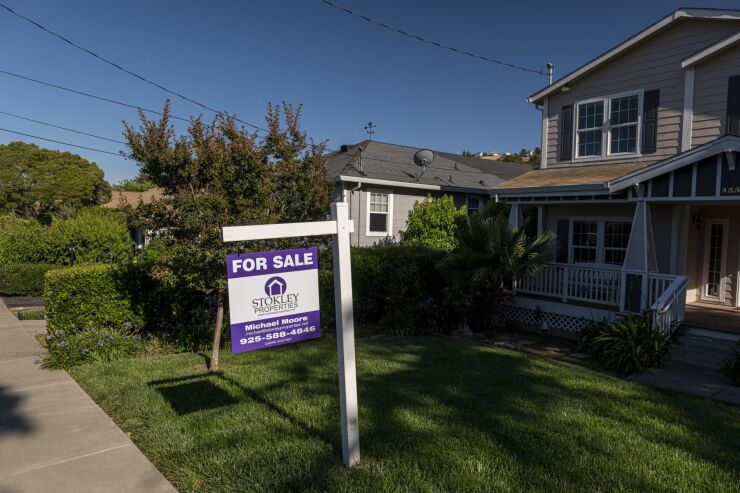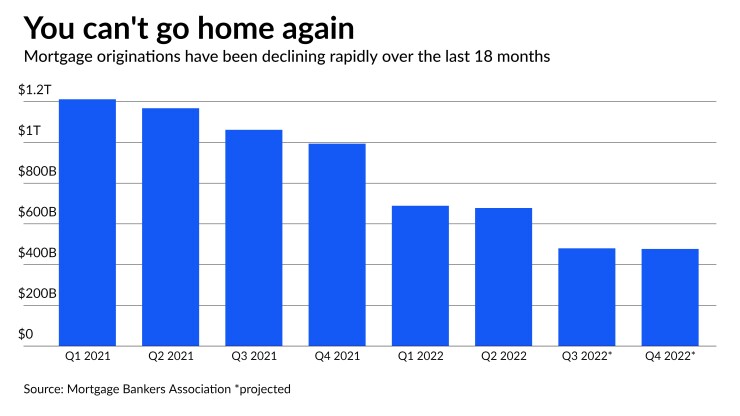Rising interest rates are wreaking havoc in the mortgage market, forcing borrowers on the sidelines and making it tough for lenders to originate home loans.
Mortgage rates have doubled this year hitting an average of
"We're in a situation where for the foreseeable short-term future, a larger and larger percentage of potential borrowers are not going to get a loan," said Bryan Filkey, chief operating officer at InterFirst Mortgage Co., a national mortgage lender based in Rosemont, Illinois.

The mortgage market is tanking from the Fed's two-pronged strategy of raising rates and
"The next three months — this winter — are going to be horrible for our industry," said Dave Stevens, CEO of Mountain Lake Consulting and a former MBA president and chief executive and former head of the Federal Housing Administration. "We're in the worst cycle for home purchases with the worst rates that we've seen in decades, compounded by global events. We all have to hope that the Fed's efforts to slow inflation work."
The MBA is predicting a 49% drop in total lending volume this year to $2.26 trillion from a year ago. Refinances are expected to plummet 74% to $671 billion while home purchases are expected to drop 14% to $1.59 trillion. The MBA forecast calls for a recession in 2023 with another 10% drop in home loan volume to $2.05 trillion. Lenders face a radically altered market after a long housing boom that brought a tsunami of refinancings, massive demand during the pandemic and years of surging home prices that have buoyed the economy.
The whiplash is being felt throughout the mortgage industry, said Susan Stewart, chief executive of SWBC Mortgage Corp., a mid-sized independent mortgage bank in San Antonio, who predicts a 25% contraction in the number of lenders as mortgage bankers sell off their businesses during this downturn.
"It's the perfect storm, and it's really got lenders rattled," said Stewart, who served as the MBA's chairman last year. "It's not unusual to have cycles that are up and down and lenders reduce staff. But this time has been much tougher because the people who have worked so hard the last two years, now lenders have to turn around and say, 'We're sorry, we have to reduce staff right now.' And that's mentally really tough."
Still, many mortgage experts point out that interest rates have been kept artificially low for more than a decade because the Fed never completely unwound the various forms of stimulus put in place after the housing crisis. The mortgage market is coming off its most profitable years ever, in which super-low rates drove soaring loan volumes and record profits for lenders.
"For the last 10 years people have been used to the Fed keeping rates artificially low to keep the economy growing, and now the Fed's not doing that anymore because we've got inflation and other problems," said Ted Tozer, principal at Ted Tozer Advisors and a former president of Ginnie Mae.
"Many people haven't wrapped their heads around what is the proper range for interest rates."
Rising interest rates are driving up mortgage rates in two ways. First, mortgage rates are increasing in line with the Fed's policy increases because 30-year mortgages typically are tied to the 10-year Treasury rate. But because Treasuries are seen as a safer and more favorable option by investors than mortgage-backed securities — the sales of which fund new mortgage originations — lenders are having to pay more to capitalize their loans and they have to charge even higher rates to offset those costs.
The Fed's tightening has thrown the secondary market "out of whack right now," Stewart said. Lenders face zero or even declining premiums, which is the profit earned by selling loans above the par rate for which the borrower qualifies. These days, a lender may lose $6,000 on a typical $300,000 loan, she said. The higher rate environment means that lenders have no wiggle room to pass costs on to consumers, typically in the form of higher rates.
"What do you do? You don't want to tell the borrower you can't do the loan," Stewart said.

Regulatory requirements also are playing a behind-the-scenes role. After the financial crisis, the Consumer Financial Protection Bureau created the Qualified Mortgage rule, which gave lenders (and investors) a safe harbor from legal liability for verifying a borrower's ability to repay a loan. The QM rule's in-the-weeds requirements are impacting profitability and a borrower's chances of getting a loan these days. The QM rule set a 3% limit on points and fees charged to a borrower. In addition, a loan's pricing must be less than 225 basis points over the average prime offer rate in order to get QM status. Most loans are not meeting the QM rule's 3% points-and-fees test.
"We have really good loans that are failing that test over and over," said Stewart. "When a lender fails that 3% test there are only two options: You just can not do the loan or you have to give a huge lender credit, which means you're closing a loan at a really big loss."
Mortgage lenders also are grousing about loan-level pricing adjustments, which are risk-based fees assessed by Fannie Mae and Freddie Mac on the basis of loan attributes such as credit scores and loan-to-value ratios. One of the challenges is that most lenders price the fees into the mortgage rate which pushes up the cost of a loan.
Filkey of InterFirst Mortgage rattled off a list of loans that he says will not get done anytime soon, shutting many borrowers out of the housing market.
"Cash-out loans, investment property loans, second- home loans, loans with lower FICOs or higher [loan-to-value ratios], high-balance loans, multiple-unit loans, condominium loans — this is where lenders are going to find themselves unable to give a borrower a loan," Filkey said.

The worry now is whether the Fed can maneuver a soft landing or a hard correction, experts said. Inflation — which had been persistently below the Fed's 2% target since 2008 — came roaring back earlier this year, in part because of global supply chain problems and further fueled by the massive stimulus injected into the economy during the COVID pandemic. Congress passed three rounds of major legislation and the Fed played a role with a round of quantitative easing in early 2020 that created "an outrageous boom in demand for real estate," said Stevens.
"They overshot the COVID scenario and I worry in the same way, they may overshoot this correction," he said, adding that rising rates "have not slowed the economy one damn bit. This whole soft landing is being debated by really great economists, and some think there's a risk of a harder correction."
Analysts are predicting a roughly 10% decline in home prices going forward. In the meantime, competition is brutal, margins are thin — if they are positive at all — and lenders are stressed for business.
"We haven't had a market like this in most people's memory," said Stewart. "The expansion of the economy has been really strong, and there was a lot of money in the market and maybe we're paying the price. The lenders that have been really careful with their balance sheet will get through to live another day, but it will be super difficult."
Kyle Campbell contributed to this article.





